Key points about describing transport options in Spanish
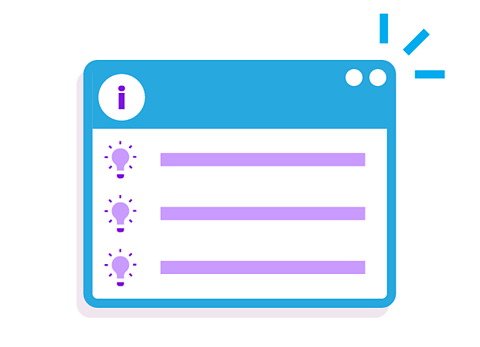
The irregularSomething that does not follow the usual or āregularā pattern. verb ir (to go) is one of the most-used in Spanish.
Use ir to talk about travel and transport in the present, past and future tenseThe verb formation that describes the time at which the action occurred, eg past, present or future. .
prepositionA word such as at, for, with, into or from which is usually followed by a noun or pronoun. Prepositions are used to show where something is in place or time. link nouns, pronouns, or phrases to other words within a sentence and are useful for giving directions.
This guide contains a video as well as a video comprehension and reading practice.
Video - Describing transport options
Watch the video of Lolo talking about travelling in Southern Spain and discussing different accommodation options.
Lolo talks about transport and accommodation options
Cuando estoy de vacaciones, me gusta ir a la costa para disfrutar del mar. Un ejemplo perfecto para estas vacaciones es el pueblo de Nerja. Nerja es un pueblo pequeƱo de la costa de MĆ”laga. Creo que Nerja es una mejor opciĆ³n que el campo porque las playas estĆ”n cerca y puedes caminar hasta allĆ.
La mejor manera para ir a Nerja es en autobĆŗs desde el centro de MĆ”laga. No podemos ir en tren como en otros muchos lugares de EspaƱa. Pero eso no es un problema, porque el servicio de autobuses es barato y hay uno casi cada hora. AdemĆ”s, podemos disfrutar de los bonitos paisajes de camino a Nerja.
En Nerja, hay diferentes opciones de alojamiento. Las dos mĆ”s comunes son el clĆ”sico hotel o buscar una casa tĆpica estilo MĆ”laga por una app en el mĆ³vil.
Aunque el hotel puede ser mĆ”s cĆ³modo, en Nerja encontramos las casas tĆpicas de la costa malagueƱa, las cuales son totalmente blancas y bonitas. Por eso, sin duda alguna, yo intentarĆa quedarme en una casa estilo MĆ”laga para vivir la experiencia completa.
Pero si quieres ahorrar algo de dinero y conocer a mƔs gente, puedes buscar un buen albergue o un camping cerca de la playa.
Translation
When I'm on holiday, I like to go to the coast to enjoy the sea. A perfect example of this holiday is the town of Nerja, a small town on the coast of Malaga. I think Nerja is a better option than the countryside because the beaches are very close and you can walk to them.
The best way to get to Nerja is by bus from the center of Malaga. We can't go by train like in many other places in Spain. But that's not a problem, because the bus service is cheap and there's one almost every hour. Additionally, we can enjoy the beautiful landscapes on the way to Nerja.
In Nerja, there are different accommodation options. The two most common are the classic hotel or finding a typical Malaga-style house through app on your phone.
Although the hotel may be more comfortable, in Nerja there are the typical houses of the Malaga coast, which are totally white, and beautiful. That's why, without a doubt, I would try to stay in a Malaga-style house to live the full experience.
But if you want to save some money and meet more people, you can look for a good hostel or a campsite near the beach.
Vocabulary- Describing travel and transport
Useful vocabulary for describing journeys:
| Spanish | English | Spanish | English |
|---|---|---|---|
| barato/a | cheap | ±č°łĆ”³¦³Ł¾±³¦“Ē/²¹ | practical, convenient |
| caro/a | expensive | ruidoso/a | noisy |
| lento/a | slow | tranquilo/a | quiet |
| °łĆ”±č¾±»å“Ē/²¹ | fast | viejo/a | old |
| “ŚĆ”³¦¾±±ō | easy | el billete | ticket |
| ³¦Ć³³¾“Ē»å“Ē/²¹ | comfortable, convenient | un retraso | delay |
| in³¦Ć³³¾“Ē»å“Ē/²¹ | uncomfortable | el trĆ”fico | traffic |
| moderno/a | modern | ĀæDĆ³nde estĆ”ā¦? | Where isā¦? |
Useful verbs to describe travel include:
| Spanish | English | Spanish | English |
|---|---|---|---|
| Sorry, something went wrongCheck your connection, refresh the page and try again. | to get off | Sorry, something went wrongCheck your connection, refresh the page and try again. | to pay for |
| Sorry, something went wrongCheck your connection, refresh the page and try again. | to catch (a bus/train etc) | Sorry, something went wrongCheck your connection, refresh the page and try again. | to lose |
| Sorry, something went wrongCheck your connection, refresh the page and try again. | to wait | Sorry, something went wrongCheck your connection, refresh the page and try again. | to forget |
| Sorry, something went wrongCheck your connection, refresh the page and try again. | to queue up | Sorry, something went wrongCheck your connection, refresh the page and try again. | to pick up |
| Sorry, something went wrongCheck your connection, refresh the page and try again. | to go on a trip | Sorry, something went wrongCheck your connection, refresh the page and try again. | to leave |
| Sorry, something went wrongCheck your connection, refresh the page and try again. | to arrive | Sorry, something went wrongCheck your connection, refresh the page and try again. | to get on |
| Sorry, something went wrongCheck your connection, refresh the page and try again. | to carry | Sorry, something went wrongCheck your connection, refresh the page and try again. | to travel |
| Sorry, something went wrongCheck your connection, refresh the page and try again. | to look for |
Have a look at the image to see how to talk about forms of transport in Spanish.
Click or tap on Show more to see a list of useful vocabulary for describing forms of transport.
| Spanish | English |
|---|---|
| el aeropuerto | airport |
| el autobĆŗs | bus |
| el aviĆ³n | plane, aeroplane |
| el barco | boat |
| el coche | car |
| la estaciĆ³n | station |
| pie, a pie | foot, on foot |
| el vuelo | flight |
Grammar - Forming 'ir' (to go) in the present, past and future tenses
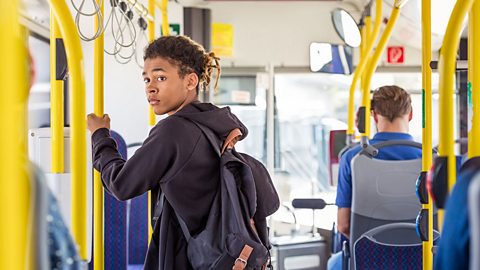
The verb ir (to go) is one of the most high frequency verbs in Spanish.
It is an irregular verb, which means it does not follow the regular pattern of other verbs. It has to be learned separately.

Click or tap on Show more to see how to conjugate the verb ir in the three most common tenses:
the present tense
the preterite (past) tense
the immediate future tense
Present tense of ir - to go
| Spanish | English |
|---|---|
| Sorry, something went wrongCheck your connection, refresh the page and try again. | I go |
| Sorry, something went wrongCheck your connection, refresh the page and try again. | you (sing. informal) go |
| Sorry, something went wrongCheck your connection, refresh the page and try again. | he/she/it goes /you (sing. formal) go |
| Sorry, something went wrongCheck your connection, refresh the page and try again. | we go |
| Sorry, something went wrongCheck your connection, refresh the page and try again. | you (plural informal) go |
| Sorry, something went wrongCheck your connection, refresh the page and try again. | they/ you (plural formal) go |
For example:
Voy al colegio en autobĆŗs. - I go to school on the bus.
Vamos de vacaciones en aviĆ³n. - We go on holiday by plane.
ĀæVas a la ciudad? - Are you going to the city?
Preterite (past) tense of ir - to go
| Spanish | English |
|---|---|
| Sorry, something went wrongCheck your connection, refresh the page and try again. | I went |
| Sorry, something went wrongCheck your connection, refresh the page and try again. | you (singular informal) went |
| Sorry, something went wrongCheck your connection, refresh the page and try again. | he/she/it/you (singular formal) went |
| Sorry, something went wrongCheck your connection, refresh the page and try again. | we went |
| Sorry, something went wrongCheck your connection, refresh the page and try again. | you (plural informal) went |
| Sorry, something went wrongCheck your connection, refresh the page and try again. | they/you (plural formal) went |
For example:
Ayer fui al colegio en coche. ā Yesterday I went to school by car.
El aƱo pasado fuimos de vacaciones en aviĆ³n. ā Last year we went on holiday by plane.
Mis padres fueron a un hotel el fin de semana pasado. - My parents went to a hotel last weekend.
Immediate future tense of ir - to go
The immediate future tense is the most common way of talking about future plans. It is formed with the present tense of ir (to go), followed by a and the infinitive.
| Spanish | English |
|---|---|
| Sorry, something went wrongCheck your connection, refresh the page and try again. | Iām going to go |
| Sorry, something went wrongCheck your connection, refresh the page and try again. | you (singular informal) are going to go |
| Sorry, something went wrongCheck your connection, refresh the page and try again. | he/she/it goes /you (singular formal) is going to go |
| Sorry, something went wrongCheck your connection, refresh the page and try again. | weāre going to go |
| Sorry, something went wrongCheck your connection, refresh the page and try again. | you (plural informal) āre going to go |
| Sorry, something went wrongCheck your connection, refresh the page and try again. | they/you (plural formal) āre going to go |
MaƱana voy a ir al colegio a pie. ā Tomorrow Iām going to walk to school.
El aƱo prĆ³ximo vamos a ir de vacaciones en barco. ā Next year weāre going to go on holiday by boat.
Mis padres van a ir a un hotel el fin de semana prĆ³ximo. - My parents are going to go to a hotel next weekend.
The verb 'ir' - Mini quiz
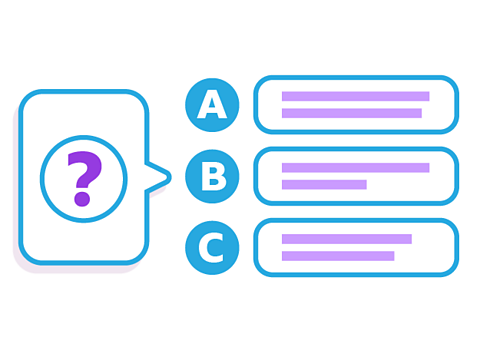
Complete the following sentences:
______ a la piscina.
Weāre going to the pool.
Vamos
Vamos is the present tense āweā form of ir.
Āæ ____ al partido de fĆŗtbol?
Are you (singular informal) going to the football match?
Vas
Vas is the present tense āyou' (singular informal) form of ir.
Ayer ______ al supermercado.
Yesterday they went to the supermarket.
fueron
Fueron is the preterite tense ātheyā form of ir.
La semana prĆ³xima ___________ de vacaciones en barco.
Next week Iām going to go on holiday by boat.
voy a ir
Voy a ir is the immediate future tense, which is formed with the present tense of the āIā form of ir (to go) followed by a and the verb in the infinitive, which in this case is also ir.
Video - Comprehension
Watch the video then answer the questions.
Rafa talks about how he gets around his hometown
- Yesterday, Rafa's dad gave him a lift to school becauseā¦
a) he woke up late
b) the bus broke down
c) it was raining
According to Rafa, how much does a bus pass cost per month?
Why does Rafa prefer to catch the bus to school instead of the train or underground?
Give three reasons why Rafa sometimes walks home from school instead of catching the bus.
What does Rafa want to do next year?
- Answer - a). Yesterday, Rafa's dad gave him a lift to school because he woke up late.
Rafa says: Normalmente voy al instituto en autobĆŗs, pero ayer fui con mi padre en coche porque no me despertĆ© hasta muy tarde. TenĆamos prisa.
I normally go to school by bus, but I went with my dad by car yesterday because I didn't wake up until very late. We were in a rush.
- Answer - ā¬50.
Rafa says: Tengo un abono. Cuesta cincuenta euros al mes, pero te sale mĆ”s econĆ³mico que comprar billetes de ida y vuelta cada dĆa.
I have a bus pass. It costs fifty euros a month but works out cheaper than buying return tickets every day.
- Answer - He always meets/bumps into his friends.
Rafa says: La red de transporte pĆŗblico de Madrid es estupenda. TambiĆ©n hay trenes y metros. Pero yo prefiero viajar en autobĆŗs porque siempre me encuentro con mis amigos.
The public transport network in Madrid is fantastic. There are also trains and an underground. But I prefer to travel by bus as I always bump into my friends.
- Answer - Any 3 of:
to avoid travelling in rush hour
there's lots of traffic
there are lots of traffic jams
the bus is very uncomfortable
there are so many people
the bus takes so long
he likes walking if it's sunny because there are lots of pretty places along the way
Rafa says: A veces, vuelvo a casa a pie para evitar viajar en durante la hora punta. Hay mucho trĆ”fico y siempre hay atascos. El autobĆŗs es muy incĆ³modo porque hay tanta gente y Ā”tarda tanto! Tardo media hora andando, pero si hace sol me gusta porque hay sitios bonitos por el camino.
Sometimes, I go home on foot to avoid travelling at rush hour. There is a lot of traffic and there are always traffic jams. The bus is uncomfortable because there are so many people and it takes a long time! It takes me half an hour to walk, and I like it if it's sunny because there are pretty places to see along the way.
- Answer - Learn to drive.
Rafa says: No tengo permiso de conducir, pero el aƱo que viene quiero aprender a conducir. AsĆ, no tengo que depender de mi padre.
I don't have a driving licence. But I want to learn to drive next year. That way, I don't have to depend on my dad.
Click or tap on Show more to read the transcript and the translation of what Rafa says.
Hola. ĀæQuĆ© tal? Soy Rafa y son las ocho y veinte. Tengo que irme al instituto.
Te vienes conmigo? Me acompaƱas?
Bueno, ĀæcĆ³mo se llega a mi instituto?
Normalmente voy al instituto en autobĆŗs, pero ayer fui con mi padre en coche porque no me despertĆ© hasta muy tarde. TenĆamos prisa. Pero hoy, me levantĆ© a tiempo. Entonces voy a la parada de autobĆŗs.
Tengo un abono. Cuesta cincuenta euros al mes, pero te sale mĆ”s econĆ³mico que comprar billetes de ida y vuelta cada dĆa.
La red de transporte pĆŗblico de Madrid es estupenda. TambiĆ©n hay trenes y metros. Pero yo prefiero viajar en autobĆŗs porque siempre me encuentro con mis amigos.
Vale, ha llegado. Ā”Tengo que subirme!
Bueno, acabo de salir del instituto.
A veces, vuelvo a casa a pie para evitar viajar en la hora punta. Hay mucho trĆ”fico y siempre hay atasco. El autobĆŗs es muy incĆ³modo porque hay tanta gente y tarda tanto.
Tardo media hora andando pero si hace sol me gusta porque hay sitios bonitos por el camino.
Ā”Ay! Ā”QuĆ© tonto! Creo que me he perdido. ĀæDĆ³nde estoy?
Perdone, ĀæcĆ³mo se llega a la Latinaā¦?
Suelo llegar a la casa sobre las cinco y cuarto.
Yo no tengo permiso de conducir. Pero el aƱo que viene quiero aprender a conducir. AsĆ, no tengo que depender de mi padre.
Bueno, he llegado. Gracias por acompaƱarme.
Vale, adiĆ³s.
Translation:
Hello. How are you? Iām Rafa and it is 8.20. I have to go to school.
Are you coming with me? Are you keeping me company?
Right, how do we get to my school?
I normally go to school by bus, but I went with my dad by car yesterday because I didn't wake up until very late. We were in a rush! But today I got up in time. So I am going to the bus stop.
I have a bus pass. It costs fifty euros a month but works out cheaper than buying return tickets every day.
The public transport network in Madrid is fantastic. There are also trains and an underground. But I prefer to travel by bus as I always bump into my friends.
OK, itās arrived. I have to get on!
Right, I have just come out of school.
Sometimes, I go home on foot to avoid travelling at rush hour. There is a lot of traffic and there are always traffic jams. The bus is uncomfortable because there are so many people and it takes a long time!
It takes me half an hour to walk, and I like it if it's sunny because there are pretty places to see along the way.
Oh. How silly. I think I am lost. Where am I?
Sorry, how do you get to la Latinaā¦
I normally get home at 5.15.
I don't have a driving licence. But I want to learn to drive next year. That way, I don't have to depend on my dad.
Right, I have arrived. Thank you for accompanying me.
OK, bye.
Vocabulary - How to give directions and buy tickets
Useful vocabulary for landmarks and describing directions includes:
| Spanish | English | Spanish | English |
|---|---|---|---|
| Sorry, something went wrongCheck your connection, refresh the page and try again. | on the right hand side | Sorry, something went wrongCheck your connection, refresh the page and try again. | (street) corner |
| Sorry, something went wrongCheck your connection, refresh the page and try again. | on the left hand side | Sorry, something went wrongCheck your connection, refresh the page and try again. | to turn |
| Sorry, something went wrongCheck your connection, refresh the page and try again. | town hall | Sorry, something went wrongCheck your connection, refresh the page and try again. | left |
| Sorry, something went wrongCheck your connection, refresh the page and try again. | to look for | Sorry, something went wrongCheck your connection, refresh the page and try again. | to pass |
| Sorry, something went wrongCheck your connection, refresh the page and try again. | road, street | Sorry, something went wrongCheck your connection, refresh the page and try again. | the square |
| Sorry, something went wrongCheck your connection, refresh the page and try again. | continue | Sorry, something went wrongCheck your connection, refresh the page and try again. | bridge |
| Sorry, something went wrongCheck your connection, refresh the page and try again. | to cross | Sorry, something went wrongCheck your connection, refresh the page and try again. | to follow, continue |
| Sorry, something went wrongCheck your connection, refresh the page and try again. | right | Sorry, something went wrongCheck your connection, refresh the page and try again. | to take |
| Sorry, something went wrongCheck your connection, refresh the page and try again. | to find |

Use ordinal numbers when giving or understanding directions:
| Spanish | English |
|---|---|
| Sorry, something went wrongCheck your connection, refresh the page and try again./Sorry, something went wrongCheck your connection, refresh the page and try again. | first |
| Sorry, something went wrongCheck your connection, refresh the page and try again./Sorry, something went wrongCheck your connection, refresh the page and try again. | second |
| Sorry, something went wrongCheck your connection, refresh the page and try again./Sorry, something went wrongCheck your connection, refresh the page and try again. | third |
| Sorry, something went wrongCheck your connection, refresh the page and try again./Sorry, something went wrongCheck your connection, refresh the page and try again. | fourth |
| Sorry, something went wrongCheck your connection, refresh the page and try again./Sorry, something went wrongCheck your connection, refresh the page and try again. | last |
For example:
Toma la segunda calle a la derecha. ā Take the second road on the right.
Gira a la izquierda y luego toma la primera calle a la izquierda. - Turn left and then take the first road on the left.
All Foundation Tier vocabulary listed in this guide can be found on the vocabulary sheet below.
Grammar - How to use prepositions of place
Prepositions link nouns, pronouns, or phrases to other words within a sentence. They connect the people, objects, time and locations of a sentence.
Prepositions are usually short words, and they are normally placed directly in front of nounThe name of a thing such as an object, a place or a person. Nouns are often described as naming words..
Useful prepositions for understanding and describing location include:
| Sorry, something went wrongCheck your connection, refresh the page and try again. | at the end of | Sorry, something went wrongCheck your connection, refresh the page and try again. | behind |
| Sorry, something went wrongCheck your connection, refresh the page and try again. | at the back of | Sorry, something went wrongCheck your connection, refresh the page and try again. | in, on |
| Sorry, something went wrongCheck your connection, refresh the page and try again. | next to | Sorry, something went wrongCheck your connection, refresh the page and try again. | opposite |
| Sorry, something went wrongCheck your connection, refresh the page and try again. | underneath, below | Sorry, something went wrongCheck your connection, refresh the page and try again. | between, among |
| Sorry, something went wrongCheck your connection, refresh the page and try again. | in front of | Sorry, something went wrongCheck your connection, refresh the page and try again. | toward, towards |
| Sorry, something went wrongCheck your connection, refresh the page and try again. | inside | Sorry, something went wrongCheck your connection, refresh the page and try again. | up to, as far as, until |
| Sorry, something went wrongCheck your connection, refresh the page and try again. | after | Sorry, something went wrongCheck your connection, refresh the page and try again. | for, in order to |
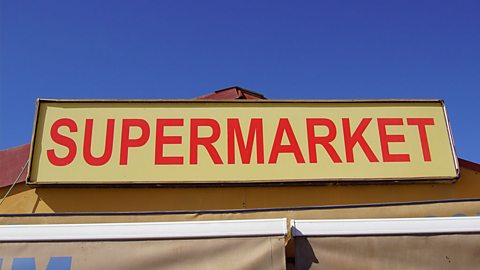
For example:
El banco estĆ” enfrente del supermercado. - The bank is opposite the supermarket.
El colegio estĆ” al lado de la piscina. - The school is next to the swimming pool.
El campo de fĆŗtbol estĆ” detrĆ”s del colegio. - The football pitch is behind the school.

Several prepositions are followed by de and then the definite article (el/la/los/las) and the noun.
If the preposition followed by de is then followed by a masculine singular noun, de and el contract to become del.
The preposition of time and place a also contracts when followed by a masculine singular noun to become al.
Prepositions of place - Mini quiz

Complete the following sentences:
La piscina estĆ” ____ ____ mercado.
The pool is opposite the market.
La piscina estĆ” enfrente del mercado.
Enfrente means āoppositeā and is followed by ādeā plus the article.
Mercado is masculine and the article is el.
De and el contract to form del.
Vaya _____ la plaza.
Go towards the square.
Vaya hacia la plaza.
Hacia is the Spanish word for towards.
Tome la ______ calle a la ______.
Take the first road on the right.
Tome la primera calle a la derecha.
Primera means āfirstā and needs to agree with calle which is feminine, and so ends in a.
Derecha means ārightā.
El banco estĆ” _____ ____ centro comercial.
The bank is behind the shopping mall.
El banco estƔ detrƔs de centro comercial.
DetrĆ”s de means ābehindā.
As centro commercial is masculine, de and e contract to form del.
Find out more about prepositions in the Prepositions of place and time in Spanish guide.
Reading practice
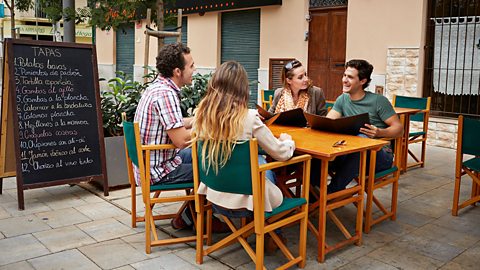
As part of a treasure hunt activity you read some directions to two different secret locations.
Translate each text into English to find out where you need to go.

Puzzle number 1
Desde la estaciĆ³n, ve hacia la Calle Principal.
Sigue todo recto hasta el banco.
Luego, gira a la izquierda en la esquina con el restaurante.
Sigue por esa calle hasta llegar a la plaza.
En la plaza, toma la calle enfrente del ayuntamiento.
La casa estĆ” a la derecha.
From the station, go towards the main street.
Go straight to the bank.
Then, turn left at the corner with the restaurant.
Continue along that street until you reach the square.
In the square, take the street in front of the town hall.
The house is on the right.
Puzzle number 2
Desde el parque, ve hacia la Plaza Mayor.
Cruza la plaza y toma la segunda calle a la derecha.
Sigue recto hasta llegar al templo.
Gira a la izquierda justo despuĆ©s del templo y continĆŗa por esa calle.
DespuƩs del puente, gira a la derecha.
La casa estĆ” al final de la calle a mano izquierda.
From the park, go towards the main square.
Cross the square and take the second street on the right.
Continue straight until you reach the temple.
Turn left just after the temple and continue along that street.
After the bridge, turn right.
The house is at the end of the street on the left.
Vocabulary sheet
Click or tap on the image below for a list of useful vocabulary to use when describing transport options.

Now you have revised the important vocabulary and key grammar points for describing transport options why not thave a look at the Talking about family and friends in Spanish guide?
More on Travel and tourism, including places of interest
Find out more by working through a topic
- count1 of 2
